Imagining the Iberian Championship
Imagining the Iberian Championship
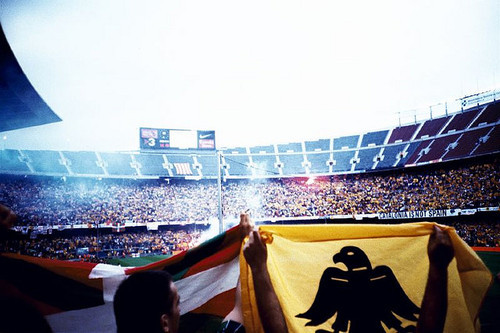

By Dermot Corrigan,
writingimagining in Madrid
While the recently growing calls for Catalan independence have led to a number of very tricky questions for politicians at local, national and European levels to ponder, they have - more importantly of course - also caused football fans to scratch their heads and wonder about the possibles issues that would arise. Along with the proposal of no more Barca-Real Madrid clásicos in La Liga, there was the idea of a Catalan national side taking part in the World Cup or European Championships and (quite likely) meeting the rump Spain team in the latter stages.
For many football watchers, this might actually be a good thing, given Spain’s dominance of international football (at senior and underage levels) over the past six years. La Roja’s ability to easily beat everyone else has become so predictable that some have grown to see current international football as boring and not worth watching. That viewpoint is a bit extreme, but even those who like watching Spain play can see the problems their untouchable excellence is causing. Coach Vicente del Bosque lamented recently that he could not find a place for Chelsea attacker Juan Mata, maybe the most in-form player in the Premier League, in his 23 man squad. “We have a problem of quantity not quality,” he said. This got us to thinking…
It does seem that the time is now ripe to establish a new competition, making use of the great wealth of talent being produced within Spain’s (current) borders, by forming new representative teams along more regional lines. While seeing Barcelona icon Xavi Hernández and Real Madrid captain Iker Casillas overcome their club rivalries to pull together in the same national team has become a common sight, the idea of Xavi lining up for Catalonia against Andrés Iniesta in a Spain shirt needs a bit of time to get your head around. But it is then actually pretty exciting. Go a bit further along the same line, by giving all Spain’s other regions / nations their own teams, and you soon get Catalonia’s Gerard Piqué marking Asturias’s David Villa and Andalucia’s Sergio Ramos clattering into the Basque Country’s Xabi Alonso.
The strength and widespread interest in such a potential new competition can be taken for granted. Remembering Jonathan Wilson’s SI.com made-up tournament to determine the best club side ever, A Football Report decided to hold an eight team tournament, with two groups of four, and the top two teams in each then progressing to the semi-finals. Players could only be born within today’s Spanish national border and must represent the team of their birthplace (as decided by Marca’s excellently encylopaedic Guía de La Liga 2013).
At first glance, the teams to include seemed pretty clear - a Catalan selection, Basque side, and an XI from Madrid, Andalucia, Galicia, and Valencia all seemed obvious entrants. A double-check on wikipedia however revealed that Spain has 17 “autonomous regions” of uneven populations and player quality. So in the end some of the stronger and geographically related smaller regions (Asturias and Cantabria, and the Balearic and Canary Islands) were combined to make up the other two teams for the group stages draw.
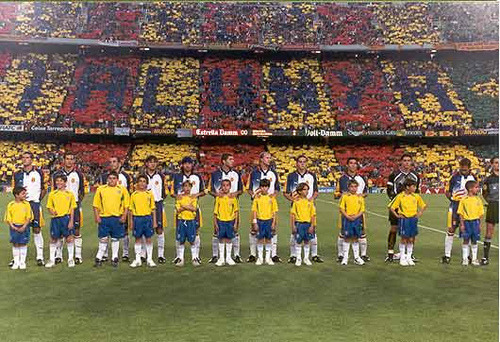
There was some controversy about the make-up of the Madrid side, given the surprising lack of players born within the municipal city limits. It was eventually decided to use the borders of the medieval kingdom of Castile, thereby including the likes of Mata (Burgos-born) and Iniesta (Albacete). The exact make-up of the Basque team also took a while to decide, but in the end we followed Athletic Club’s most recent elastic definition and Navarre was included alongside the provinces of Guipúzcoa, Vizcaya and Álava, meaning Fernando Llorente, Javi Martínez, Iker Muniain and Gorka Iraizoz were all included.
Given their smaller playing populations, the provinces of Estremadura, Aragon, La Rioja and Murcía unfortunately had to be excluded, meaning some decent Spanish players such as Andrés (Osasuna / Murcia), Botía (Sevilla / Murcia), Cani (Villarreal / Aragon), Camacho (Málaga / Aragon) and Pedro León (Getafe / Murcia) missed out, but - as Ryan Giggs and George Weah know - them’s the breaks. The idea of including fellow Iberians Portugal (and maybe Gibraltar and Andorra) was also considered, but seen to be too logistically difficult to manage at such short notice.
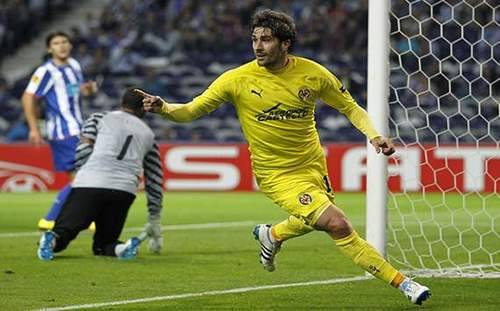
Sorry Cani, you can play in the next Iberian Championship…
The boundary-drawing (and archives searching) did lead to the discovery of some fish who have seemingly long been living out of their natural water. As well as the obvious - Iniesta born near Madrid, Alonso from the Basque Country - there were some surprises. Deportivo la Coruña veterans Juan Carlos Valerón and Manuel Pablo found themselves pulling on an ‘Islas Unidas’ jersey as, despite playing more than 600 games between them for Galician side over the last 15 or so years, both are native Canary Islanders.
Other players whose careers took them (relatively) far away from their origins are Carlos Marchena, best known for playing at Valencia, now at Depor, but born in Sevilla (Andalucia). Andrés Palop will be forever identified with Sevilla’s European successes during the last decade, but was born and began his career at Valencia. Beñat Etxeberria came through the ranks down at Real Betis but, as his name suggests, he was born a Basque. Manchester City’s Javi Garcia came through Real Madrid’s youth system, but is from Almería (Andalucia). Pedro Rodríguez is well known as a graduate of Barca’s La Masia academy, while David Silva came through Valencia’s underage sides, but hail from Tenerife and Gran Canaria respectively.
Then there were the pretty obvious calls. Casillas, Carlés Puyol and Levante centre-half Sergio Ballesteros are clearly captaincy material for their regions, while summer Bayern Munich signing Javi Martínez gets to return to the Basque Country if not to Athletic. FC Barcelona backbone the Catalan selection, while Real Mallorca are well represented among the Islas Unidas team.
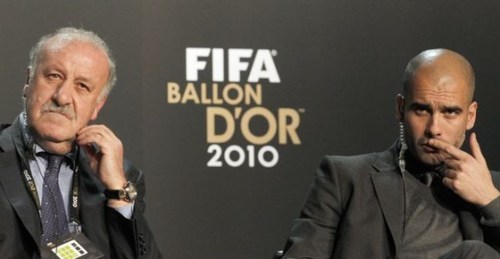
The coaches of each selection also stay close to their roots. With Vicente del Bosque sagely declining to take sides, fellow Madrid legend Míchel helms Castille, while Josep Guardiola takes a break from his sabbatical to coach Catalonia. Other managers returning home are Unai Emery, back in the Basque Country on leave from CSKA Moscow, and Joaquín Caparrós, departing Mallorca for a few weeks to take charge of his native Andalucia.
A look at the starting XIs submitted this week by each region’s coach shows a number of surprising strengths and weaknesses. A lack of Castile born defenders means a call up for Sunderland’s Carlos Cuellar to partner Osasuna’s Alejandro Arribas at centre-half. With Las Islas short between the posts, Las Palmas’ young reserve keeper Raúl Lizoáin gets a chance to impress. As Lionel Messi cannot play, veteran Raúl Tamudo, currently at Mexican side Pachuca, provides a different sort of cutting edge up front for Catalonia. Meanwhile both Andalucia (Navas, Joaquín, Isco, Callejón) and Cantabria & Asturias (Cazorla, Michu, Adrián, Villa) can field pretty fearsome fours in attack.
Some of those who miss out completely include international quality Premier League based goalkeepers David de Gea and Pepe Reina (Casillas keeps them out again). Reina’s Anfield clubmate Jose Enrique (so we can have Juanfrans at both right and left-back for Valencia) and Valencia’s often injured Sergio Canales (given the competition for places in attack for Asturias & Cantabria) are excluded as well. Atlético Madrid’s in-form midfield trio of Raúl García, Kiko and Mario Suárez can also feel hard done by, but their exclusions just go to show how difficult the decisions were for each coach given the depth of talent available.
All those not making the cut will perhaps have a chance to prove themselves later in tournament, as each coach can make two changes between the group stages and the knock-out rounds, and suspensions and injuries are no doubt likely to bite. The group draw takes place next week, with Del Bosque himself due to do the honours at the ceremony in the neutral surroundings of Andorra.
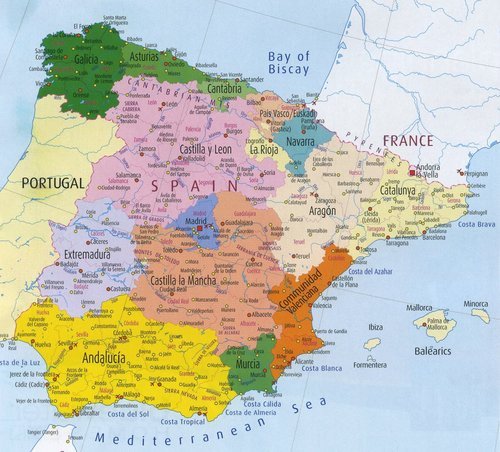
While you’ll have to check back soon for more details as the tournament progresses, here are your teams for the Iberian Cup:
Castile (coach Michel): Casillas (Madrid); Tito (Rayo), Cuellar (Sunderland), Arribas (Osasuna), Arbeloa (Madrid); Mata (Chelsea), Valero (Fiorentina), Gabi (Atletico), Iniesta (Barca); Negredo (Sevilla), Torres (Chelsea).
Catalonia (coach Guardiola): Valdés (Barça); Montoya (Barça), Piqué (Barça), Puyol (Barca), J Alba (Barça); Busquets (Barça), Xavi (Barça), Fábregas (Barca); Verdú (Espanyol), Raúl Tamudo (Pachuca), Tello (Barça).
Basque Country (coach Unai Emery): Iraizoz (Athletic); Iraola (Athletic), Javi Martinez (Bayern), San Jose (Athletic), Monreal (Malaga); Beñat (Betis), Xabi Alonso (Madrid), Arteta (Arsenal); Ander (Athletic), Llorente (Athletic), Susaeta (Athletic).
Andalucia (coach Joaquín Caparrós): Javi Varas (Celta); Jesús Gámez (Málaga), Marchena (Depor), Ramos (Madrid), Nacho (Betis); Javi García (Man City), Apoño (Zaragoza); Navas (Sevilla), Joaquín (Málaga), Isco (Málaga), Callejón (Madrid).
Valencia (coach Juan Ignacio Martínez): Palop (Sevilla); Juanfran (Atletico), Ballesteros (Levante), Albiol (Madrid), Juanfran (Levante); Xavi Torres (Getafe), Albelda (Valencia), Bruno (Villarreal); Nino (Osasuna), Soldado (Valencia), Pablo (Swansea).
Las Islas Unidas (coach Paco Jémez): Raúl Lizoáin (Las Palmas); Manuel Pablo (Depor), Ximo Navarro (Mallorca), Ramis (Swansea), Luna (Sevilla); Martí (Mallorca), David Silva (Man City), Nsue (Mallorca); Dani Benítez (Granada), Rubén Castro (Betis), Pedro (Barça).
Galicia (coach Fran): Diego López (Sevilla); Mallo (Celta), Barragán (Valencia), Mosquera (Madrid Castilla), Seoane (Depor); Fran Rico (Granada), Diego Castro (Getafe); Trashorras (Rayo); Jon Pereira (Betis), Iago Aspas (Celta), Nano (Osasuna).
Cantabria & Asturias (coach Marcelino García Toral): Mario (Racing); Javi Venta (Villarreal), Paredes (Zaragoza), Alvaro (Zaragoza), José Ángel (Real Sociedad); Míchel (Getafe), Javi Fuego (Rayo); Cazorla (Arsenal), Michu (Swansea), Adrián (Atletico); Villa (Barça).
This (soon-to-be) series was written by Dermot Corrigan, who is an expert on Spanish football and has written for the likes of ESPN, When Saturday Comes, and Fox Soccer. You should follow him on Twitter at @dermotmcorrigan. Comments below please.







